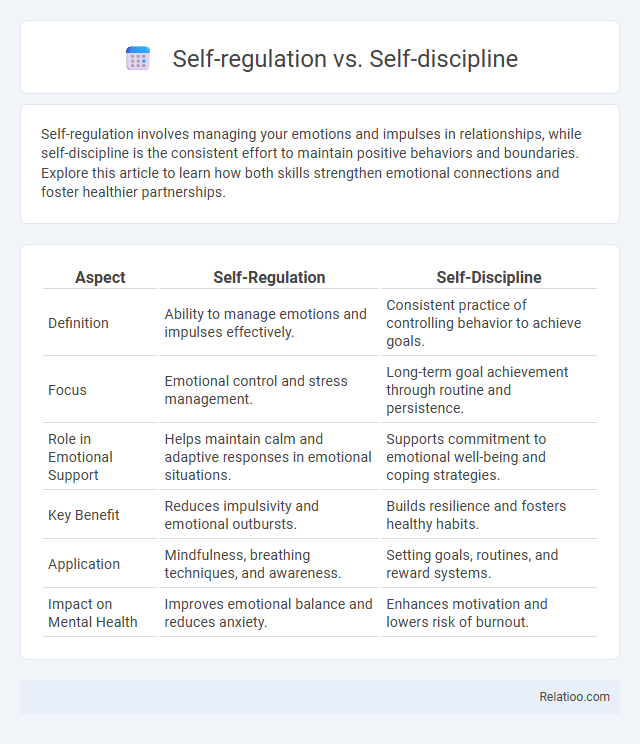Self-regulation involves managing your emotions and impulses in relationships, while self-discipline is the consistent effort to maintain positive behaviors and boundaries. Explore this article to learn how both skills strengthen emotional connections and foster healthier partnerships.
Table of Comparison
| Aspect | Self-Regulation | Self-Discipline |
|---|---|---|
| Definition | Ability to manage emotions and impulses effectively. | Consistent practice of controlling behavior to achieve goals. |
| Focus | Emotional control and stress management. | Long-term goal achievement through routine and persistence. |
| Role in Emotional Support | Helps maintain calm and adaptive responses in emotional situations. | Supports commitment to emotional well-being and coping strategies. |
| Key Benefit | Reduces impulsivity and emotional outbursts. | Builds resilience and fosters healthy habits. |
| Application | Mindfulness, breathing techniques, and awareness. | Setting goals, routines, and reward systems. |
| Impact on Mental Health | Improves emotional balance and reduces anxiety. | Enhances motivation and lowers risk of burnout. |
Understanding Self-Regulation
Understanding self-regulation involves managing emotions, thoughts, and behaviors to achieve long-term goals, distinguishing it from self-discipline which emphasizes consistent effort and willpower. Self-regulation incorporates cognitive processes such as emotional control, impulse management, and adaptive decision-making, making it a dynamic, situational skill. Research highlights that effective self-regulation boosts mental health, enhances academic performance, and improves interpersonal relationships.
Defining Self-Discipline
Self-discipline is the ability to control your impulses, emotions, and behaviors to achieve long-term goals through consistent effort and perseverance. Unlike self-regulation, which involves managing your reactions and responses in the moment, self-discipline emphasizes sustained commitment and deliberate practice over time. Understanding how self-discipline functions allows you to build habits that enhance productivity, resilience, and personal growth.
Key Differences Between Self-Regulation and Self-Discipline
Self-regulation involves managing your emotions, thoughts, and behaviors to achieve long-term goals, while self-discipline specifically focuses on maintaining consistent effort and resisting short-term temptations. Key differences emphasize that self-regulation is a broader process encompassing emotional control and adaptability, whereas self-discipline is more about persistence and willpower. Understanding these distinctions helps you develop strategies for better personal growth and goal achievement.
The Science Behind Self-Regulation
Self-regulation involves managing emotions, behaviors, and thoughts to achieve long-term goals, supported by prefrontal cortex activity responsible for executive function. Neuroscientific studies reveal self-discipline as a component of self-regulation, emphasizing consistent effort and delayed gratification through neural pathways linked to willpower and impulse control. The science behind self-regulation highlights the dynamic interaction between cognitive functions, emotional regulation, and motivational systems crucial for adaptive behavior and goal attainment.
The Psychology of Self-Discipline
Self-discipline involves controlling impulses and emotions to achieve long-term goals, while self-regulation encompasses managing thoughts, feelings, and behaviors in alignment with personal standards and environmental demands. Psychological studies emphasize that effective self-discipline relies on robust self-regulation skills, including emotional regulation and cognitive control, which enable persistence despite challenges. Neuropsychological research highlights the role of the prefrontal cortex in supporting executive functions critical for maintaining self-discipline through sustained attention and decision-making processes.
Benefits of Developing Self-Regulation
Developing self-regulation enhances emotional control, allowing individuals to manage impulses and maintain focus under pressure. It contributes to improved decision-making and long-term goal achievement by fostering patience and persistence. Self-regulation supports mental well-being by reducing stress and promoting adaptive coping strategies.
Advantages of Strengthening Self-Discipline
Strengthening self-discipline enhances your ability to consistently achieve long-term goals by improving focus, reducing procrastination, and fostering resilience against distractions. Unlike self-regulation, which adapts behavior in response to external feedback, self-discipline actively builds habits that maintain motivation and commitment without constant external prompts. The advantages of a disciplined mindset include increased productivity, better stress management, and greater control over impulses, ultimately leading to sustained personal and professional growth.
Real-Life Examples of Self-Regulation vs Self-Discipline
Self-regulation involves managing emotions and impulses in real-time, such as calming oneself during a stressful meeting, while self-discipline emphasizes long-term goal adherence, like consistently following a fitness routine despite temptations. For example, a student exercising self-regulation might pause and refocus when distracted during study hours, whereas self-discipline drives them to maintain a strict study schedule daily. These distinctions highlight self-regulation as moment-to-moment control and self-discipline as sustained behavioral commitment.
Strategies to Improve Both Skills
Self-regulation involves managing emotions and behaviors to achieve long-term goals, while self-discipline focuses on maintaining consistent actions despite challenges. Strategies to improve these skills include setting clear, achievable goals, practicing mindfulness to increase awareness, creating structured routines, and employing positive reinforcement to sustain motivation. Developing both skills enhances personal productivity and emotional resilience through deliberate habit formation and strategic planning.
Choosing the Right Approach for Personal Growth
Self-regulation involves managing your emotions and impulses, while self-discipline is the practice of consistently following rules and routines to achieve long-term goals; understanding these distinctions helps tailor your approach to personal growth effectively. Prioritizing self-regulation enhances emotional intelligence and stress management, whereas cultivating self-discipline builds resilience and productivity in daily habits. Balancing both strategies offers a comprehensive path to self-improvement and sustainable success in personal development.

Infographic: Self-regulation vs Self-discipline
 relatioo.com
relatioo.com